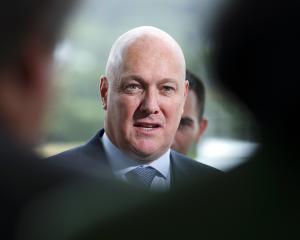Dr Smith has been accused of ''political interference'' and ''bullying'' in comments he made about the council, whose statutory role is to advocate for better water quality in lakes and rivers - claims he vehemently denies.
It seems exactly what was said at the meeting, what was implied and what was intended remain open to interpretation, however.
Association of Freshwater Anglers president David Haynes, one of several people at the meeting with concerns about Dr Smith's alleged stance, has been most vocal in his criticism, which has been widely reported.
He has alleged Dr Smith's talk of ''tweaking'' Fish and Game was a ''threat'' to back off regarding its water-quality advocacy, particularly concerning dairying and irrigation.
Mr Haynes has claimed the Conservation Minister's comments included saying ''Fish and Game sometimes behaves like a rabid NGO, worse than Forest and Bird'', ''if we all want computers and iPhones then a decline in water quality is the price we must pay'' and ''Don't be noisy ... when you are noisy you burn goodwill''.
Fish and Game chief executive Bryce Johnson has reportedly backed Mr Haynes' account of the meeting, including Dr Smith's attitude towards the organisation and implications concerning restructuring it if it did not tone down its stance.
However, Dr Smith says Fish and Game chairman Peter Robinson has apologised to him over the ''biased account''.
Dr Smith has denied the accusations and meeting accounts, and on Monday released official notes from the meeting to counter them.
He claims he told the meeting Fish and Game needed to collaborate with agriculture and irrigation to get the best outcomes for freshwater, and denies telling the council it was standing in the way of the Government's economic agenda.
He was reported as saying: ''I told them Fish and Game ... does sometimes get into the space of being anti New Zealand's most important industry, that being the dairy industry.''
Dr Smith said yesterday he had ''heeded the prime minister's advice'' and decided not to proceed with defamation action against Mr Haynes.
After speaking to his lawyer, Dr Smith decided that he would instead send a letter to Mr Haynes to tell him that his statements were defamatory and offensive.
The notes from the meeting, taken by what Dr Smith says was a ''neutral'' Doc official, shine little light on the details of what was said at the meeting, being not a transcript but seven short synopses of the minister's major points of discussion, the first of which was that ''F&G need to work out what they want to be: a statutory body with legislation and a relationship with Govt, or an NGO?''
Fish and Game is a Crown entity set up under the Conservation Act.
It reports to the Conservation Minister although it is independent of the Government and answerable to Parliament.
It is funded solely through the sale of fishing and hunting licences.
It has a clear statutory role to advocate and develop environmental policies to help protect the country's natural freshwater resources (the habitats of sports fish and game birds).
That role clearly includes advocating for ''environmentally sustainable farming practices'' as well as advising the minister on relevant issues.
Dr Smith as Conservation Minister is responsible for overseeing the Department of Conservation's own equally clearly mandated role in freshwater protection.
There is no doubt the country is facing an economy/industry/tourism/conservation conundrum.
Critics may feel Dr Smith appears to walk a fine line sometimes in his role as minister, perhaps muddying the waters with his statements about the need to consider economic benefits alongside conservation values.
What is perhaps most important in this war of words is that all aspects are able to be aired and considered.
Voices for the environment are as important as voices for industry and tourism.
By listening and learning from each other, collaboration and compromise might be possible for the good of all who live, work and play in God's Own.
For without the balance of all advocates, the picture would surely be much greyer - in every sense of the word.












